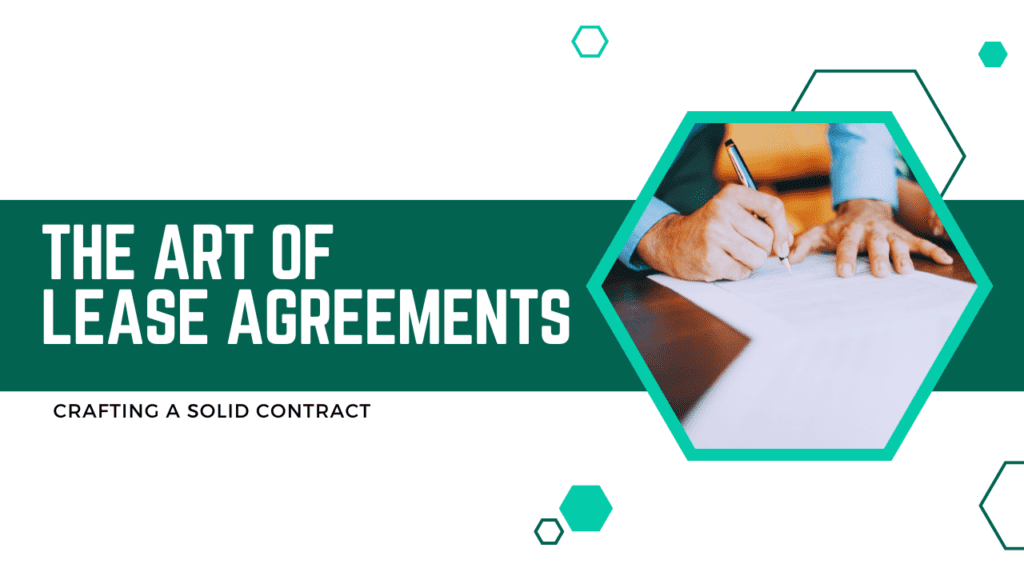
Renting out property in Los Angeles is an excellent investment, thanks to high rental values and a strong pool of qualified tenants. It’s not as easy as posting a listing and choosing a tenant, however. Effectively renting out a home requires a lot of work and proper leasing, management, and maintenance to be successful.
Today, we’re focused on the leasing part.
One of the primary responsibilities of rental property owners is to provide a solid lease agreement for their tenants. A lease agreement is a legally binding document that outlines all the terms and conditions involved in a rental property. Crafting a strong lease agreement can help prevent misunderstandings and legal problems in the future.
As Los Angeles property managers, we’ve been negotiating, drafting, and executing lease agreements with tenants for years. We want to discuss the art of lease agreements and how to craft a solid contract that protects you and your property in Los Angeles.
Ensuring your Lease Agreement Complies with California Laws
California has specific laws and regulations related to rental agreements and what they must include. If you’re unaware of these regulations or your lease does not comply with them, you won’t be able to enforce that lease.
Make sure you are using a lease agreement that’s specific to California. Pulling a lease template off the internet that was written for New York rental properties will not help you. You’ll need your lease to include all the necessary state disclosures around things like lead paint, toxic chemicals, bed bugs, fireplace safety, and sexual predators. California leases must now address rent stabilization and whether your rental property is included in rent control laws or exempt from them.
Where can you get a lease that’s compliant with California laws? Check in with your local Los Angeles property manager because there maybe specific addendums for city like West Hollywood, Santa Monica, Beverly Hills, and etc. We can provide you with our template. You can also look for resources through organizations such as your local chapter of the National Association of Residential Property Managers (NARPM), the California Apartment Association, or the Institute of Real Estate Management, and Apartment Association of Greater Los Angeles.
Names and Contact Information for Tenants and Owners
A good lease starts with specific identifying information. You want to identify the property as well as the tenants who live in the property and the party responsible for managing that property, whether it’s the owners or professional property managers.
Every adult 18 years of age and older who will live in the property should be included as a tenant on the lease agreement. Include their full names and some sort of identifying information, such as a social security number and driver’s license number. Residents under 18 years of age are not legally responsible for rent, but they should still be included in the lease so you know who they are.
The lease should specifically state that occupancy is limited to the parties listed on the lease. You don’t want any long-term visitors in your property who have not been screened.
Make sure your information is included as well, and if you’re working with a property manager, reference who they are and instruct tenants to communicate with your management company.
Define Your Lease Terms and Conditions
A lease agreement should be thorough, detailed, and leave no room for ambiguity. It should clearly outline all the terms and conditions of the tenancy agreement. Some of the essential details that should be included are:
- Rental amount and due date as well as late payment consequences
- Security deposit amount
- Lease start and end dates
- Renewal conditions
- Pet policy
- Rental property rules and regulations
- House Rules
- HOA Rules and Regulations(if applicable)
It is crucial to ensure that all these details are defined and agreed upon by the tenant before signing the lease. Make sure you discuss them in detail ahead of move-in, especially your rent collection policy.
Maintenance and Repair Policies
A lease agreement must also include a section that outlines maintenance and repair responsibilities between tenants and landlords. Maintaining your investment property will require a team effort, and your tenant needs to know what your expectations are around reporting maintenance and contributing to the upkeep of your property.
This section of the lease should specify who will be responsible for repairs and maintenance in the rental property. For instance, tenants will likely be responsible for minor maintenance, such as replacing light bulbs and air filters and keeping the property clean. Landlords will be responsible for significant repairs such as fixing plumbing and electrical systems.
You’ll want your lease to be clear about how maintenance needs are to be reported. Emergencies may need to be called in. You’ll want to know immediately if there’s a fire or a flood. Routine repairs, however, can be requested in writing so you have the documentation. Stress the importance of tenants making their maintenance requests immediately so you can avoid deferred and unreported issues.
Have Your Property Manager or Attorney Review the Lease
 Before you and your tenant sign the lease agreement, make sure you have it reviewed by an experienced landlord/tenant attorney or a Los Angeles property manager. This will ensure you have all the necessary language included, and that you have not left out anything that needs to be addressed before a successful rental experience can begin.
Before you and your tenant sign the lease agreement, make sure you have it reviewed by an experienced landlord/tenant attorney or a Los Angeles property manager. This will ensure you have all the necessary language included, and that you have not left out anything that needs to be addressed before a successful rental experience can begin.
Every rental property is different, so even with a consistent lease agreement or a reliable template, there may be customizations that need to be included. For example, if your tenant is moving in with pets, you’ll absolutely want a pet addenda in there.
Crafting a solid lease agreement is an integral part of successfully renting out a property in Los Angeles. You want to make sure your lease agreement is clear, concise, and legally binding, with no room for misunderstandings. Some of the key things to consider include understanding state and local laws related to rental agreements, defining the terms and conditions, addressing maintenance and repair policies, clarifying the consequences of violations, and consulting with a real estate attorney or property manager before you sign that lease.
Investing time and effort in crafting a solid lease agreement can protect your investment and help prevent legal problems in the future.
If you’d like some help putting together a lease, please contact us at Earnest Homes. We’d be happy to help with all of your Los Angeles property management needs.
